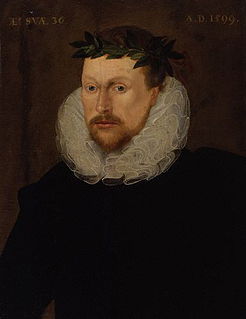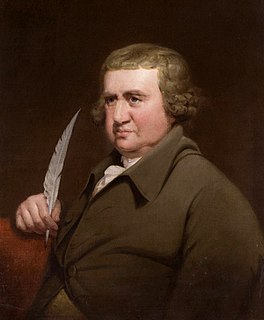A Quote by William Shakespeare
What valor were it, when a cur doth grin, for one to thrust his hand between his teeth, when he might spurn him with his foot away?
Related Quotes
Here when the labouring fish does at the foot arrive, And finds that by his strength but vainly he doth strive; His tail takes in his teeth, and bending like a bow, That's to the compass drawn, aloft himself doth throw: Then springing at his height, as doth a little wand, That, bended end to end, and flerted from the hand, Far off itself doth cast. so does the salmon vaut. And if at first he fail, his second sommersault He instantly assays and from his nimble ring, Still yarking never leaves, Until himself he fling Above the streamful top of the surrounded heap.
He raised his eyes. "Sister. See. This time I knew you." Asha's heart skipped a beat. "Theon?" His lips skinned back in what might have been a grin. Half his teeth were gone, and half those still left him were broken and splintered. "Theon," he repeated. "My name is Theon. You have to know your name.
Some souls think that the Holy Spirit is very far away, far, far, up above. Actually he is, we might say, the divine Person who is most closely present to the creature. He accompanies him everywhere. He penetrates him with himself. He calls him, he protects him. He makes of him his living temple. He defends him. He helps him. He guards him from all his enemies. He is closer to him than his own soul. All the good a soul accomplishes, it carries out under his inspiration, in his light, by his grace and his help.
The king is but a man, as I am; the violet smells to him as it doth to me; the element shows to him as it doth to me; all his senses have but human conditions; his ceremonies laid by, in his nakedness he appears but a man; and though his affections are higher mounted than ours, yet, when they stoop, they stoop with the like wing.
Hence when a person is in great pain, the cause of which he cannot remove, he sets his teeth firmly together, or bites some substance between them with great vehemence, as another mode of violent exertion to produce a temporary relief. Thus we have the proverb where no help can be has in pain, 'to grin and abide;' and the tortures of hell are said to be attended with 'gnashing of teeth.'Describing a suggestion of the origin of the grin in the present form of a proverb, 'to grin and bear it.'
The sobs and tears of joy he had not foreseen rose with such force within him that his whole body shook and for a long time prevented him from speaking. Falling on his knees by her bed. He held his wife's hand to his lips and kissed it, and her hand responded to his kisses with weak movement of finger. Meanwhile, at the foot of the bed, in the midwife's expert hands, like the flame of a lamp, flickered the life of a human being who had never existed before.
Lastly came Winter cloathed all in frize, Chattering his teeth for cold that did him chill; Whilst on his hoary beard his breath did freese, And the dull drops, that from his purpled bill As from a limebeck did adown distill: In his right hand a tipped staffe he held, With which his feeble steps he stayed still; For he was faint with cold, and weak with eld; That scarce his loosed limbes he hable was to weld.
And still Meriadoc the hobbit stood there blinking through his tears, and no one spoke to him, indeed none seemed to heed him. He brushed away the tears, and stooped to pick up the green shield that Eowyn had given him, and he slung it at his back. Then he looked for his sword that he had let fall; for even as he struck his blow his arm was numbed, and now he could only use his left hand.
The master in the art of living makes little distinction between his work and his play, his labor and his leisure, his mind and his body, his information and his recreation, his love and his religion. He hardly knows which is which. He simply pursues his vision of excellence at whatever he does, leaving others to decide whether he is working or playing. To him he's always doing both.
I do not mean to call an elephant a vulgar animal, but if you think about him carefully, you will find that his nonvulgarity consists in such gentleness as is possible to elephantine nature-not in his insensitive hide, nor in his clumsy foot, but in the way he will lift his foot if a child lies in his way; and in his sensitive trunk, and still more sensitive mind, and capability of pique on points of honor.





































